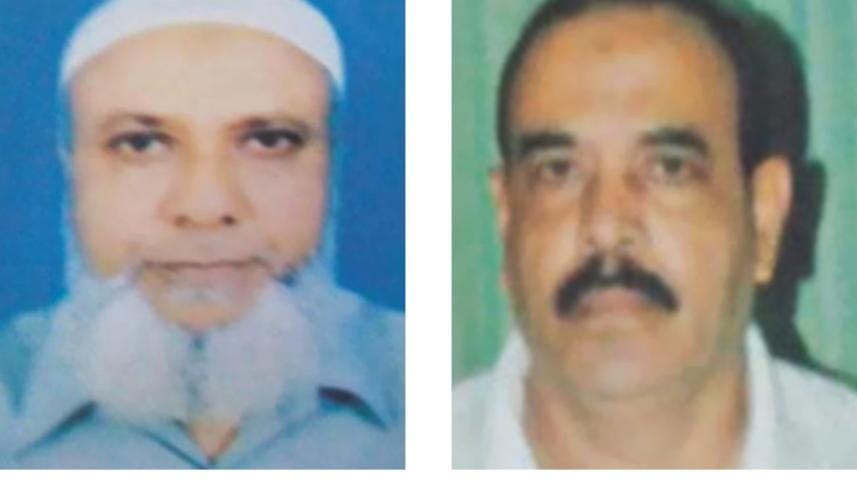Two Netrakona war criminals to die

The International Crimes Tribunal-1 yesterday sentenced Obaidul Haque Taher and Ataur Rahman Nani to death for committing crimes against humanity during the Liberation War.
The court found the razakars of Netrakona guilty in four out of six charges brought against them. It gave them death penalty in two charges; imprisonment until death in two others and acquitted them from two charges.
“...We are of the view that no punishment other than death will be equal to the said horrendous and barbaric crimes for which the accused persons have already found guilty beyond reasonable doubt in the charge no-3 and -5,” said Justice Anwarul Haque, chairman of the tribunal.
“It may be mentioned here that the accused persons expressed no repentance for their such conduct at any stage, and we do not find any mitigating factors to award lesser sentence to the accused persons other than death,” said the chairman.
The government would decide whether they would be executed by hanging or shooting, he said.
“We are satisfied with the verdict ... It would be good if they are executed as soon as possible,” Mizanur Rahman, a survivor of Taher and Nani's crimes and a prosecution witness in the case, told The Daily Star over telephone.
Taher, 66, was the commander of Netrakona Razakar Bahini, an auxiliary force of the Pakistan army in 1971, while Nani, 62, was a member of that force.
According to one of the two charges that got them the death penalty, Taher and Nani, accompanied by other razakars and the Pakistan army men attacked three villages -- Laufa, Asma and Gumuria -- under Barhatta Police Station on October 19, 1971, and detained 10 people.
Seven of the detainees were later shot dead while one survived with bullet injuries and two were freed. The razakars also raped women there.
About the charge, the verdict read: “The attack was so outrageous and organised that had kept the near relatives including the fathers of some of victims captured from their houses [as listed in charge no.3] in such a vulnerable condition that despite witnessing the perpetrators accompanied by the accused persons taking away their near and dear ones forcibly they could not resist it.
“Even one of the civilians was forcibly dragged out when he was reciting the holy Qur'an. It is hard to believe that the accused persons and their accomplices were really human beings. Their barbaric wrongdoing had rather painted the notion of humanity with untold shame and shock,” it read.
The second charge that brought them death said the duo along with other razakars detained seven people including Badiuzzaman Mukto, an organiser of Liberation War, at Birampur Bazar between November 15 and 16 in 1971 and tortured them keeping confined to a torture camp. Later, six of them were shot dead.
The verdict on the charge said, “Similarly, the relatives of the victims captured forcibly from Birampur Bazar remained mere spectators even on seeing the attack directed upon their relatives who were eventually killed.”
One of the two charges for which they were given imprisonment until death said razakar commander Taher and his accomplice Nani accompanied by other razakars and the Pakistan army men attacked Baushi Bazar under Barhatta Police Station and looted valuables of 400-450 shops and 20-25 houses of the Hindus on August 17, 1971.
They also detained and tortured seven to eight people, including local Awami League leader Fazlur Rahman. All but Fazlur were released. Taher, Nani and other razakars took Fazlur to Trimohoni Bridge and shot him dead, the charge added.
The second charge said razakars under the leadership of Taher on October 4, 1971, caught footballer Dabir Hossain at Sree Sree Narosingh Jeur Akhra and took him to Zilla Parishad Bungalow where he was tortured all day. He was later shot dead near Moktarpara Bridge in Netrakona town.
The tribunal, however, acquitted them from two charges; an act of genocide that left 15 Hindus dead; and the deportation of the Hindus of Netrakona town in May 1971.
After the latest reconstitution of the Tribunal-1 on September 15 last year, this was the first verdict delivery. Prison authorities produced Taher and Nani before the tribunal at 10:20am.
Three judges -- Justice Anwarul Haque, Justice Md Shahinur Islam and Justice Md Shohrowardi -- read the summary of the 268-page verdict in presence of prosecutors, defence lawyers, accused family members, and journalists.
After the judgment, Prosecutor Mukhlesur Rahman Badal said the prosecution was happy with the verdict while defence counsel Gazi MH Tamim said they would appeal to the Appellate Division of the Supreme Court.
According to the law, a war crimes convict could file an appeal with the Supreme Court within 30 days from the date of the verdict's pronouncement.
With Taher and Nani, two war crimes tribunals so far convicted 26 people for committing crimes during the Liberation War.


 For all latest news, follow The Daily Star's Google News channel.
For all latest news, follow The Daily Star's Google News channel.
Comments